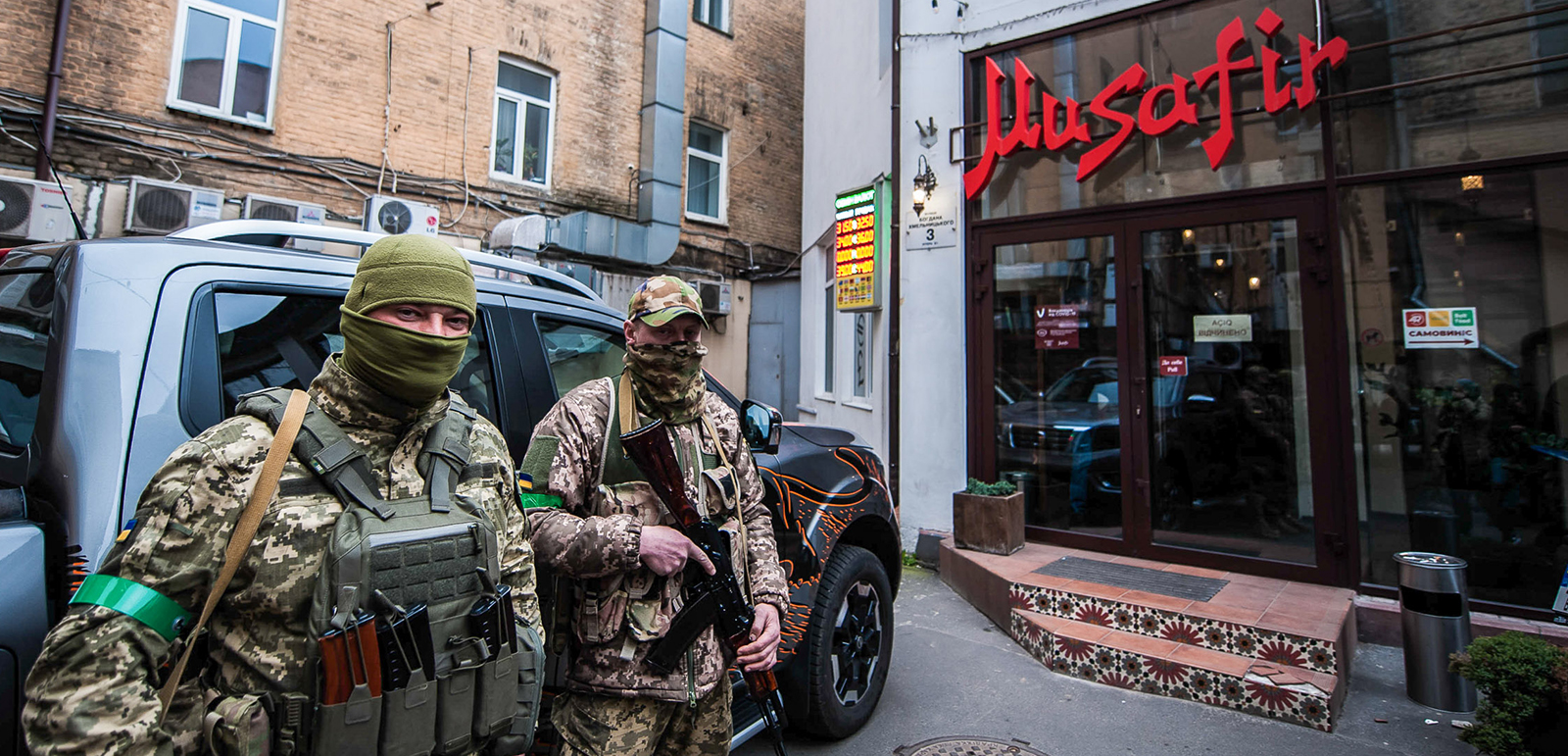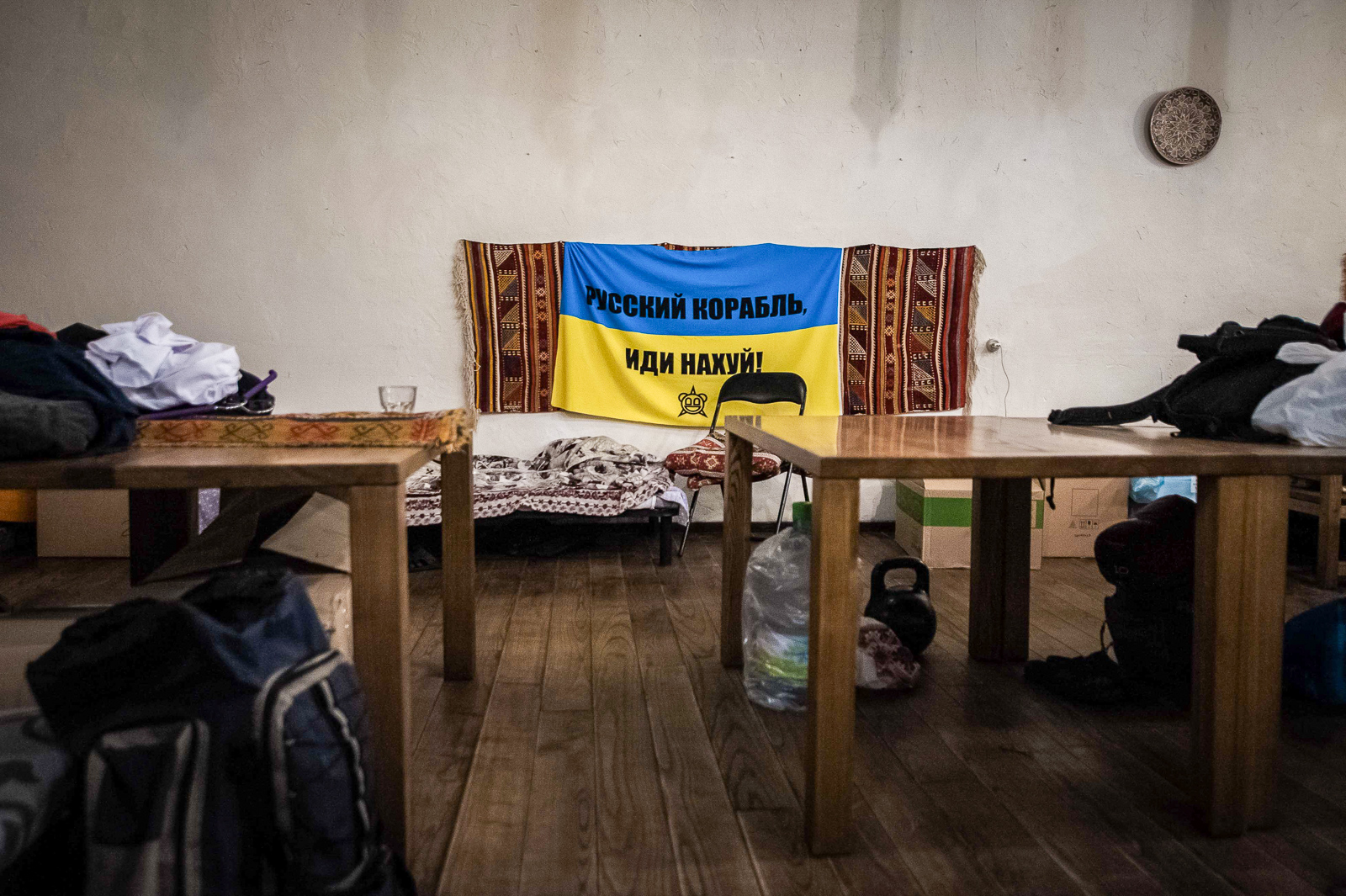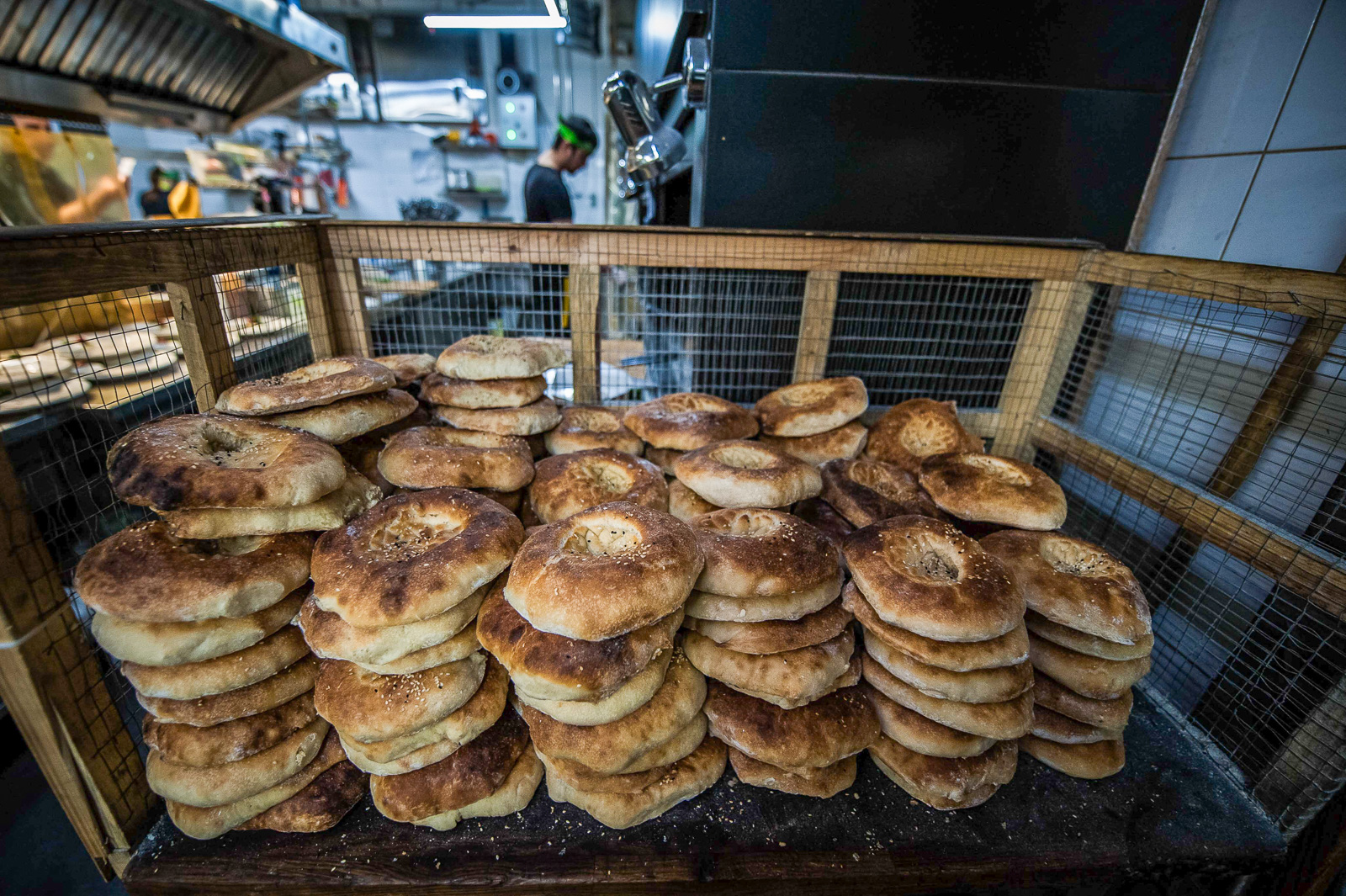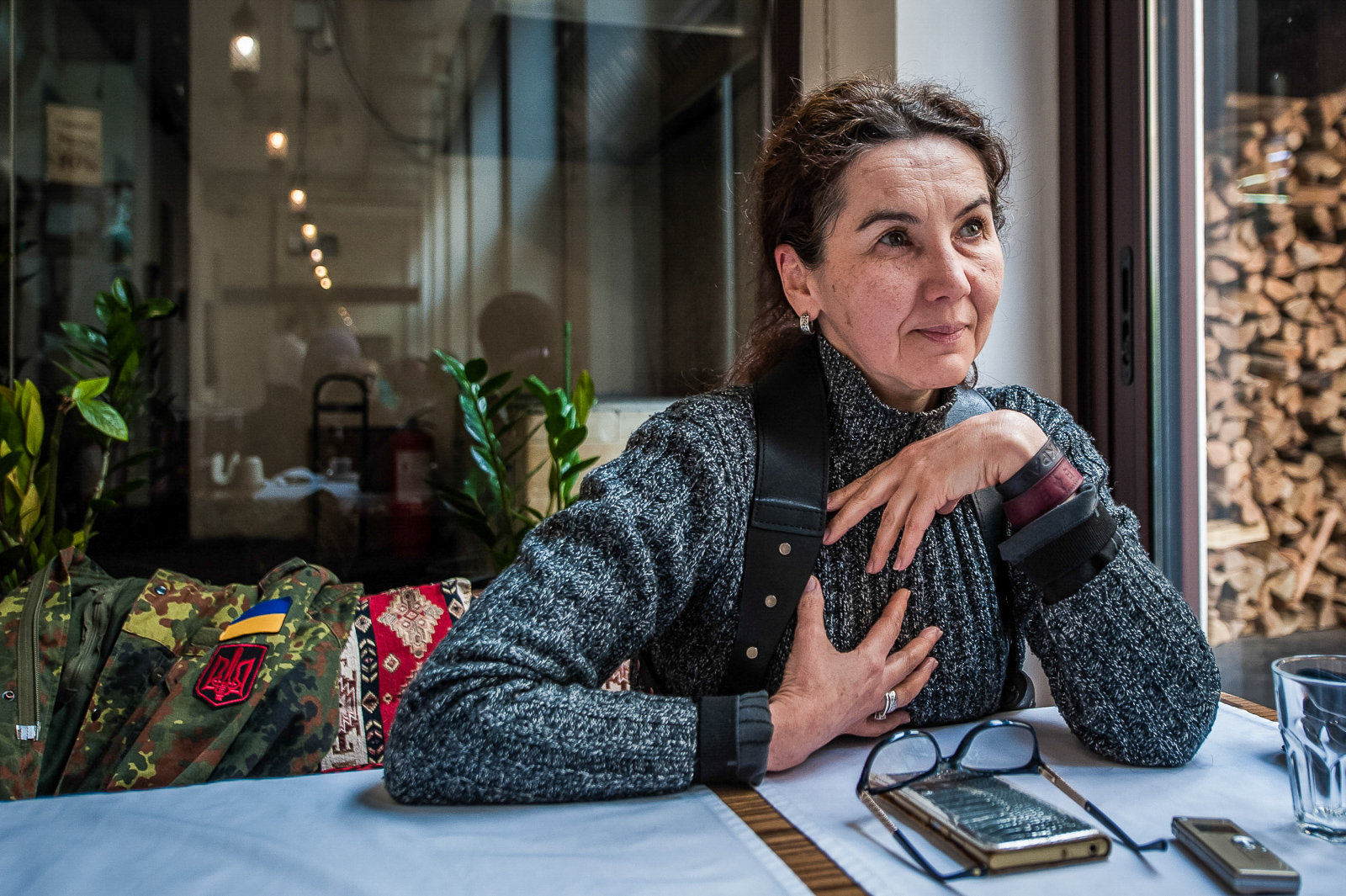Meet the Ukrainian-Muslim ‘food warriors’ of Kyiv
Before the Russian invasion of Ukraine, one restaurant won a loyal clientele by serving vibrant Crimean Tatar cuisine. Now, it is providing hundreds of free meals every day to fighters and people in need
–

The day starts early with coffee, cleaning and wake-up techno music in the kitchen. By 3pm, the workers at Musafir restaurant in Kyiv have prepared up to 400 free meals for Ukraine’s defenders and people in need, as well as catering for a growing number of paying customers seeking some normality in the midst of war. The last guests leave early, to comply with a military curfew. Then, employees who have lost their homes to the Russian invasion push together the restaurant’s benches to make beds for the night.
Owned by Crimean Tatars, Ukraine’s indigenous Turkic Muslim minority, Musafir (which means “Guest” in the Crimean Tatar language) has kept working for almost the entire duration of the war so far. Much loved by Kyivans and visitors, it is also one of few places now serving halal cuisine for the Ukrainian capital’s Muslim population, which was estimated at up to 40,000 before the conflict began.
Located in a courtyard off a central Kyiv street, the restaurant reopened to the public two weeks after Russian forces invaded. In response to the offensive, which began on 24 February, more than half of Kyiv’s population had fled for safer places. Meanwhile, Russian forces were dug in in the nearby towns of Irpin and Bucha, and the city’s outskirts were being shelled every day.
At first, Musafir’s wartime menu consisted only of coffee, soup and chebureki – fried meat pastries popular in central Asian cuisine. The handful of guests it served were mostly soldiers or war correspondents covering the conflict.
“At that time, news was coming from Irpin and Bucha that Russians were killing everyone, Kharkiv was being shelled heavily, and we opened the restaurant,” said Musafir’s co-owner Kemal (family names have been withheld for security reasons). “We asked around, ‘Should we do it, should we not do it?’ People said, ‘Yeah, open. It’s a good message.’ So, we opened and, actually, people came. It was like, it’s wartime and you’re drinking really good coffee, like a normal person. It somehow gave a little fresh air.”
Fighting is still raging in the east and south of Ukraine, but as Russian forces have retreated from around Kyiv, people are returning. Despite occasional strikes against the city, including a Russian missile which recently killed one person in a residential building, it is once again hard to get a lunchtime table at Musafir, and the owners have just reopened two sister outlets in the city.
“War is war, but dinner is dinner,” said Andrii Atroshchenko, a Ukrainian NGO worker waiting patiently in line, one recent Saturday. For him, Musafir is not just a place to get such Crimean Tatar specialities as tatarash (dumplings), lagman (meat and noodle soup) and burma (savoury pastries). It is a symbol of both the diversity and the unity of his country, across religions and cultures. Now, the restaurant also serves “Ukrainian lagman” — otherwise known as borscht, Ukraine’s national dish — which was put on the menu when beetroots and cabbage were all that was available to the chefs.
“This is a part of Ukraine, and a part of the traditions that are on our territory,” said Atroshchenko. “Here, you can see the spirit of Crimea and of Crimeans.”
Contributing to the war effort
When Russia invaded Ukraine, more than three months ago, US intelligence predicted that Kyiv could fall within days. Keeping the restaurant open was the last thing on Kemal’s mind. Instead, he joined an exodus from Kyiv, driving his wife and children, along with his sister’s family, 400 miles to the border with Poland and to safety abroad. Then, he and his brother-in-law Rustem, who is also a co-owner of Musafir, turned back to fight for their country.
“We wanted to come back not to open the restaurant, but to sign up with the Territorial Defence Forces,” said Kemal.

Other than essential food shops in Kyiv, everything from banks to places of worship had closed overnight. Air raid sirens wailed into empty streets and nights were punctuated by explosions and gunfire at the edges of the city. The Territorial Defence Forces, made up of local volunteers and military reserves, were overwhelmed by the number of experienced people who wanted to join. Along with many others, Kemal and Rustem — a banker and a screenwriter, respectively — were turned away.
“So, we thought, ‘We have to do something’,” said Kemal.
Musafir had always been managed and run by Kemal and Rustem’s wives, Sorina and Emine. Now, the two men found themselves with a kitchen stocked with enough food for an establishment that had previously served up to 800 customers a day. Most of the employees had left Kyiv, but two cooks and three service staff were sleeping in the restaurant’s basement for safety.
Kemal and Rustem realised they could contribute to the war effort in another way: by feeding people.
Eager to help, they contacted Said Ibragimov, the former mufti of the Umma Religious Administration of Muslims of Ukraine. Ibragimov had joined the Territorial Defence Forces and was acting as a chaplain for Muslim members. If Musafir produced meals, he offered to distribute them to brigades deployed around the city, which were dependent upon donations to supply everything but their weapons.
The kitchen swung into action. Soon, other requests started coming: from the state railway company, for staff and refugees on evacuation trains; from the army and police; from elderly people unable to buy food from the dwindling supplies in shops. By mid-March, Musafir’s small team, working without pay, were making hundreds of free meals each day. The owners decided to reopen the restaurant for paying guests, mainly to help fund its voluntary efforts.
“They’re food warriors,” said Tamila, a family friend of the owners. Along with an Orthodox Christian chaplain, she delivers Musafir’s meals to different groups of Territorial Defence Forces, including a unit of Ukraine-based Muslims from Dagestan, Chechnya and Uzbekistan.

Before the war, Kyiv had several dozen halal shops and restaurants. The majority closed when the war started. In addition to Musafir, one Turkish owner of several restaurants returned to Kyiv to organise the delivery of meals to people sheltering from Russian shelling in the city’s metro stations.
The city’s two mosques have reopened, after shutting their doors for several weeks, although attendance has fallen drastically. Before the war, up to 1,000 worshippers used to attend Friday prayers at the Kyiv Islamic Cultural Centre. Now, it’s more like 60.
Reopening the restaurant
Until 2014, two-thirds of Ukraine’s estimated one million Muslims lived in Crimea and the country’s eastern Donbas region. Russia’s annexation of Crimea in 2014 and the conflict Russia fomented in the Donbas forced thousands to move to government-controlled areas of Ukraine.
For some, it was a second historical displacement. In 1944, as part of Soviet leader Joseph Stalin’s policy of population transfer, the majority of Crimean Tatars were deported from Crimea. Most were taken to Uzbekistan, more than 2,000 miles away.
After 1991, when Ukraine gained its independence, about 250,000 returned to their homeland. Since the 2014 annexation of Crimea, the Crimean Tatar language and culture has been repressed and Russian courts have sentenced more than a hundred Crimean Tatars on trumped-up charges of religious terrorism.
This campaign of control and intimidation is how Musafir ended up in Kyiv. The restaurant first opened in 2007, in the Crimean town of Bakhchisaray, and established itself as a firm local favourite. The owners — Kemal’s brother and family — were prominent opponents of the Russian annexation and were subjected to repeated searches and inspections by Russian state services. Eventually, the establishment was forced to close in 2015.
In May that year, a new Musafir opened in Kyiv. It quickly became popular among Kyivans and visitors for its tasty, reasonably priced dishes, friendly staff and vivid Crimean Tatar identity, expressed in food, decor and, before the war, live traditional music. According to Kemal, about a quarter of the restaurant’s customers were Muslim. By 2022 there were three branches, and more than250 staff.

As only about 30 employees have returned to Kyiv, Musafir’s owners are recruiting new staff. The availability and prices of supplies are still unpredictable. The restaurant’s halal meat supplier, based in west Ukraine, shut down his Kyiv factory when the war started. To supply Musafir, he drove a van filled with 200 kilograms of meat almost 400 miles to the capital. Restaurant staff then had to store and process it on the premises.
With half of the kitchen still turned over to the provision of free meals, space is stretched to the limit. Sacks of potatoes are piled on the veranda, and the basement, which used to be a popular spot for large private parties, now acts as a storeroom for dry goods. With its thick walls providing shelter from possible shelling, it has also become a dormitory for staff who need it.
Several Musafir workers have had to flee their homes in Irpin and other towns north of Kyiv. Although the area is now back under Ukrainian control, many buildings have been destroyed and are without gas, electricity or water.
After the last guests have left and the curfew starts, up to 15 people curl up in quilts and sleeping bags, or sit quietly chatting over tea and sunflower seed snacks. While Kyiv appears to be gradually returning to normal, it’s a reminder that the war is far from over.
Arzu and Oksana Manserova, from an Azeri family in central Ukraine, lived in Irpin and had planned to leave Musafir by the end of the year to open their own beauty salon. Now those plans lie in tatters.
“But it’s so nice here in Musafir; soon we probably won’t ever want to go home at all,” said Oksana. “When you’re here, you feel like life is going on.
“Here in our courtyard, there’s no war.”
Topics
Get the Hyphen weekly
Subscribe to Hyphen’s weekly round-up for insightful reportage, commentary and the latest arts and lifestyle coverage, from across the UK and Europe
